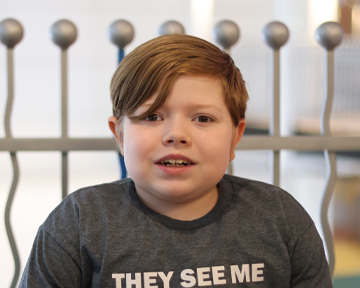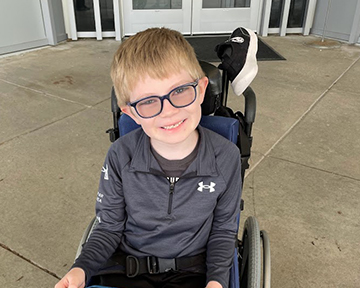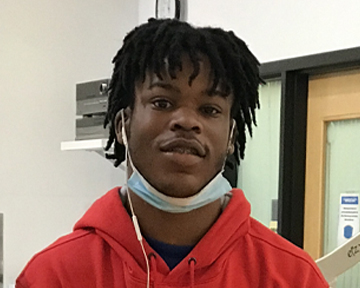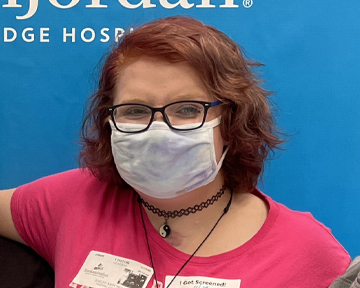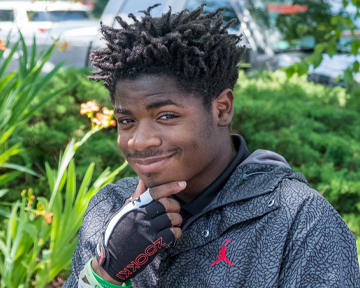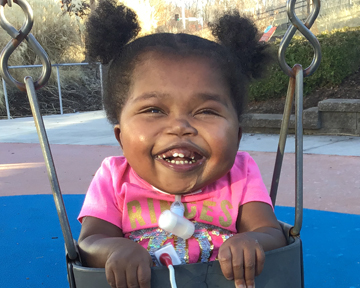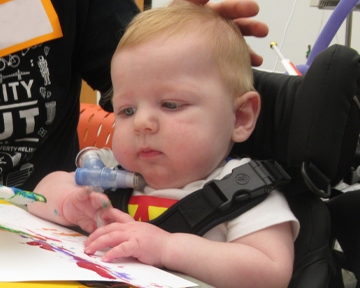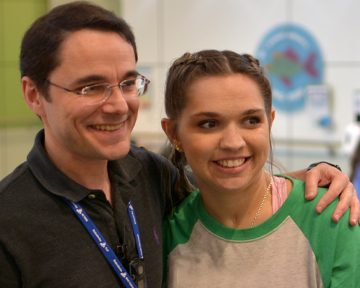Lily
Finally Finding Help and Hope for Bowel Issues
Lily's Story
Lily has been struggling with bowel movements since she was 1. Her mom, Nancy, didn’t think much of it at first because Lily was still young and she thought the situation would improve. Unfortunately, it didn’t. Lily spent the next four years in diapers.
When Lily was 2, the family moved across the country from California to Connecticut. The adjustment was difficult for the family, especially Lily. She began to have meltdowns around toilet training and also began to regress in other areas such as speech.

Autism Diagnosis Sheds Some Light
“With this diagnosis, things clicked and made sense,” Nancy says. “It explains why Lily is so sensitive and would have such intense meltdowns.”
The autism diagnosis went hand in hand with Lily’s encopresis, which is a condition that causes a cycle of constipation and bowel leakage.
“We couldn’t go anywhere because Lily wouldn’t pee or poop in a diaper or a toilet except for in our own house,” Nancy says. “It was a behavior we couldn’t break and it was affecting her health and her social life. People treated her differently.”
Regression and Frustration
Lily would get so severely constipated that she required medical treatment. In an attempt to relieve the constipation, Lily had several cleanse regimens but nothing helped long term.
Lily’s bowel issues were affecting the whole family as Nancy tried to balance Lily’s intensive needs with her 3-year-old son’s needs.
“We live five minutes from the beach and we wanted to go there to play but no matter how much we prepared ahead of time, Lily would almost always have a meltdown along with a soiling accident,” Nancy says. “It was difficult to explain to our young son why we couldn’t go to the beach.”
Two years ago, the family decided to try an outing to a museum in New York City. The busy museum’s bathroom had multiple stalls.
“When Lily used the bathroom, there were lots of flushes,” Nancy recalls. “That event caused her to regress dramatically. She lost a year and a half of development. We had to start all over with speech and language. Going there is my worst regret.”
To cope with the challenges they faced, Nancy and her husband, Jack, joined a parent support group. “It’s hard to explain to other people and even schools why this issue is such a big deal,” Nancy says. “It’s not just constipation—it’s very serious.”
Nancy and Jack exhausted nearly every avenue trying to find help for Lily. One behavior specialist told them they were setting Lily up to be in diapers for the rest of her life. Lily’s school worked with her for two years but Lily would still urinate in a Pull-Up while sitting on the toilet.
“My husband and I would take turns sitting in the bathroom with Lily for long sessions but she wouldn’t go,” Nancy says. “Some experts said it was an attention-seeking component that we needed to extinguish. It was so stressful and was destroying my relationship with my daughter. It has been heartbreaking for us as a family. We were ready to try anything.”
Discovering a Place for Progress
“Together, they got Lily to a good place so we thought we would try Ranken Jordan to take us further,” Nancy says.
Nancy’s sister is a resident at St. Louis Children’s Hospital who learned about Ranken Jordan’s Functional Gastrointestinal (GI) Clinic during her training rotations. The clinic offers a specialized Bowel Training Program created for children ages 5 to 18 with chronic constipation and bowel leakage.
Ranken Jordan offers the only inpatient program like this in the St. Louis area. The hospital also offers an outpatient Bowel Training Program.
Lily and Nancy arrived at Ranken Jordan in June 2021. Nancy admits after being disappointed at so many other places, she came with low expectations for success.
“We weren’t sure if Lily would be a candidate for the program because she was so complex,” Nancy says. “So many specialists before had told us they couldn’t help or that they had gone as far as they could. We’ve been to all the Northeastern medical powerhouses to find help for Lily and finally found Ranken Jordan. It has been fantastic.”
Lily made immediate progress.
Ranken Jordan’s Bowel Training Program therapist specializes in bowel issues and is trained in pediatric pelvic floor therapy. Lily performed intensive exercises to strengthen her core and pelvic floor.
Building on Lily’s previous progress, the Ranken Jordan team used a similar approach to Lily’s OT and ABA team at home in Connecticut. Ranken Jordan also used biofeedback, which was new for Lily.
Biofeedback helps children gain more body awareness and control. Biofeedback training reads muscle activity and helps children identify the appropriate muscles needed for healthy bowel control.
Intensive Therapy Makes a Difference
“Lily received so much therapy support at Ranken Jordan. The intensive therapy every day is working.”
She says Ranken Jordan was able to push Lily in ways not possible in home therapy. “The medical management under one umbrella frees therapists to try new things with a level of comfort. If a treatment triggered Lily, they could adjust medications on the spot.”
Lily’s confidence began to grow as she saw more success.
“Lily has always wanted to get better but before she was terrified to take the first step,” Nancy says. “At Ranken Jordan, she has seen success so she is believing in herself. Lily is doing things now that she would never do before like walk into a new bathroom. One day, she was in a stall in a larger bathroom at Ranken Jordan and someone else came in and flushed. Lily had no reaction. Before she would have had a meltdown.”
Lily has been terrified of bathrooms in general, Nancy explains. “She could pee at home but nowhere else. This is the rigidity that goes with autism. But now she is mastering going in different bathrooms. This has opened doors for her. I can finally take her places she couldn’t go before. It’s huge.”
Lily’s bathroom at Ranken Jordan became her safe place. Early in therapy when Nancy tried to take Lily off the toilet, Lily had a meltdown.
“Ranken Jordan’s in-house pediatric psychologist came immediately and talked Lily through her anxiety so she could get off the toilet,” Nancy recalls. “When we have moments like this and don’t know how to respond, having someone else step in and say ‘hey I’ve got this’ is so helpful. We don’t have this at home. This 24/7 therapy contributed to Lily’s success.”
Opening Doors to a Fuller Life
Lily benefited from just being a kid at Ranken Jordan. She played with other kids, did puzzles, and especially liked playing on the outdoor playground. These are things she couldn’t confidently do before.
The team worked closely with Nancy and Lily to smooth the transition home to ensure continued success. Lily asked for a waffle maker if she could achieve all her GI goals. She was successful and is now enjoying homemade waffles since she has been home.
“At Ranken Jordan, I’ve learned to feel a sense of hope,” Nancy says. “This is the biggest thing for me because I had none before. We were in such a dark place with this. Since we came here, I’ve seen wall after wall tumble down for Lily. I’m so grateful.”
More Patient Stories
“I still think about how Ranken Jordan changed my life.”
— Kiland Sampa, Inpatient Jul-Nov 2013, Outpatient Dec 2013-Dec 2014

